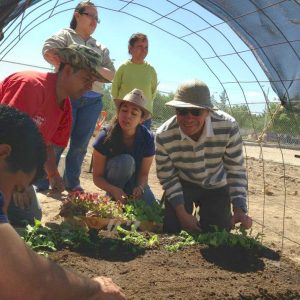Written by Roxana Honowitz
Spring 2017
If someone told you that they could solve the problems of the world, would you believe them? In many ways, this is the question I tried, and am still trying to answer this semester during my internship at MESA.
MESA, or the Multinational Exchange for Sustainable Agriculture, is an organization that seeks to change the current food system by putting people over profit, leading the way through Earth Stewardship, equitable economies, and multicultural alliances worldwide. After twenty years in existence, MESA was interested in learning not just what the organization was doing, but also and more importantly, if and how their work impacted the lives of farmers and communities.
I began my internship at MESA reading and collecting research on impact evaluations of agroecological interventions. After hours of reading I was unnerved to settle on the conclusion I’d found – many of the organizations that advocate ways they work to change the world often fail to evaluate whether their work is making any real change at all. This disturbing conclusion said to me that the perception of fixing the world was more important to these researchers, practitioners, and organizations, than the change itself. I was left to wonder – how can anyone make the world a better place when we define success simply as the intention for progress?
Growing up with two parents who worked in the nonprofit sector, I felt frustrated. In my mind, these organizations had always been the goal. To be employed by one of them meant not just spending long hours of my life working, but spending long hours of my life working for a purpose. Needless to say, creating indicators to evaluate MESA’s work began to have much greater importance than a simple assignment for my internship.
After about a month of dense reading, it was time for me to begin looking inward at the work MESA was doing. Over the course of the next few weeks I compiled what were the easily identifiable indicators of physical change. This included sustainable farming practices such as crop rotation, cover crop, mulching, etc. I enjoyed this aspect because these were the same indicators I’d been looking at in my agriculture courses, and I knew what they meant and what asking about them entailed. As I began looking into the social and cultural aspects of change, however, I ran into a few big roadblocks. How do you measure societal change? How is this done impartially? What and who defines improvement?
 These big questions left me with a lot of room to think. I needed indicators that were quantitative enough to be impartial, but I also had to track things like a farmer’s ability to feel a part of his or her political system. It was no easy task. Several meetings and hours of research later, I’d created a table that looked at MESA’s goals and set up means to evaluate these goals based off a mix of biophysical and social indicators using a range of methods. I was reminded of my frustration earlier in the semester and I began to realize that often times it is a lack of ability that prevents many organizations and interventions to evaluate change. These aren’t easy measurements to identify or track, especially in organizations that are already hard-pressed for funds.
These big questions left me with a lot of room to think. I needed indicators that were quantitative enough to be impartial, but I also had to track things like a farmer’s ability to feel a part of his or her political system. It was no easy task. Several meetings and hours of research later, I’d created a table that looked at MESA’s goals and set up means to evaluate these goals based off a mix of biophysical and social indicators using a range of methods. I was reminded of my frustration earlier in the semester and I began to realize that often times it is a lack of ability that prevents many organizations and interventions to evaluate change. These aren’t easy measurements to identify or track, especially in organizations that are already hard-pressed for funds.
Whether or not my work at MESA will create an exact review of their impact on the world, this project has taught me about the importance of analyzing impact, both as an organization seeking to change the world as well as an individual. Many of the students at Berkeley, myself included, have gone into challenges with the mindset that in tackling large problems, we are doing our part to leave the world better than we found it. While this is not necessarily a bad mindset to have, it is only half of the puzzle. Every time we devote our time to the list of activities we use to decorate our resumes, its important to also remember that we can only be sure of meaningful change when we put in the effort to examine the impacts of our work.

